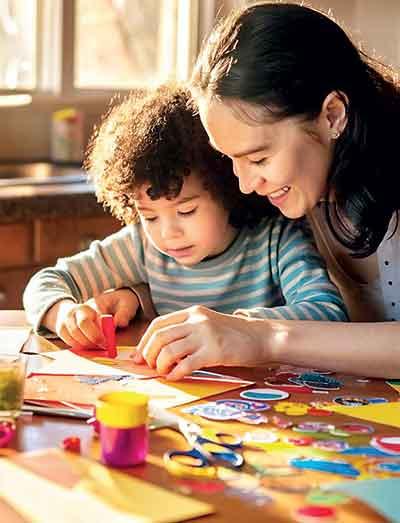 In the 1950s, Talcott Parsons, a functionalist sociologist, argued that both the father and the mother had well-delineated roles to play within the family. Parsons viewed the father as the "instrumental leader," overseeing discipline and acting as the breadwinner for the family, while the mother was seen as being the "expressive leader," responsible for the nurture and upbringing of the children. If we trace our history back to our grandparents' or even parents’ generation, we can readily identify with Parsons' view of the family.
In the 1950s, Talcott Parsons, a functionalist sociologist, argued that both the father and the mother had well-delineated roles to play within the family. Parsons viewed the father as the "instrumental leader," overseeing discipline and acting as the breadwinner for the family, while the mother was seen as being the "expressive leader," responsible for the nurture and upbringing of the children. If we trace our history back to our grandparents' or even parents’ generation, we can readily identify with Parsons' view of the family.
Postmodernists, on the other hand, have questioned the conventional roles in the family, arguing that individuals should be free to choose their roles as parents. A good example is the modern career woman who also supports her family financially, proving that such roles are not as rigid as they once were. The reality, in quite a few homes in Sri Lanka today (if we are being honest!), is that Parsons' perspective of the role of the father tends to still be the norm, while the role of the mother tends to be a cross between the functionalist and postmodernist views. The question is not which approach is accurate or true but whether or not fathers need to become more engaged in the upbringing of their children.

The Excuses That Keep Fathers on the Sidelines
Many fathers excuse their lack of involvement in parenting with statements such as:
- "I'm too busy at work!"
- "My wife is better at bringing up the kids!"
- "I don't want to interfere in how my wife brings up the kids!"
- "I'm away from home a lot and I don't want to scold my children in the short time I get to spend with them!"
These are frequently uttered justifications from fathers who regularly leave matters of discipline, education, and moral upbringing to wives exclusively. As much as the reasons may sound genuine, they do not nullify the reality that fathers and mothers share an equal responsibility of raising their children.

Should Mothers Have the Sole Responsibility of Setting Boundaries?
Children need boundaries set on them. A household with a single parent that disciplines and sets rules can bring about inconsistency that will perplex children. When fathers step back from disciplining their children, it places an extra burden on mothers to play the ‘bad cop’ while fathers get to be the ‘fun parent.’ This is not just unfair but will also lead to behavioural problems in children. Ironically, most often children eventually get past their adolescent tantrums, and learn to appreciate the efforts of the mother and subconsciously disapprove of the father for not imposing rules, thereby ruining their relationship with their father.
Children thrive best when both parents set rules and both parents enforce them. A unified front from both parents shows children what to expect and what the consequences will be if they don’t behave, rather than establishing a parent-against-parent dynamic. When fathers refuse to discipline their children, it reinforces the wrong signal that discipline is solely the mother’s responsibility, and only serves to perpetuate outdated gender roles.
The Danger of Parental Manipulation
Children are highly perceptive and quickly learn how to manipulate situations for their own benefit. If parents are unevenly strict and soft, children will naturally turn to the soft parent because they can get away with it. Not only does this speak of an unhealthy dynamic in the home, but also strips both parents of their authority. For example,
if a mother says "no" to something and the father later says "yes," the child will learn that boundaries are not set in stone. This can lead to behaviours of disobedience, dishonesty, and entitlement. Fathers need to make sure that they support their spouses’ decisions and not countermand them. Parenting is a team effort, and both parents must present a united front.
The Father's Role in Non-Nuclear Families
Even in non-nuclear families, single-parent families, blended families, and same-sex parent families, the father figure, who can be anyone from a stepfather and grandfather to an uncle and a close family friend, is equally important. Father figures provide stability, direction, and emotional support for children, illustrating that the upbringing of a child is not rooted in blood ties but love, commitment, and deliberate effort. Similar to a nuclear family environment,
children benefit from various visions and teachings offered by involved father figures in the development of their personality, tenacity, and perception towards relationships. The absence of a nuclear family must not diminish the importance of a father figure to children but instead emphasizes the flexibility of parenthood in all aspects.

The Role of Fathers in a Child’s Life
What do children learn from their fathers? A great deal. Studies have consistently proven that involved fathers positively influence the cognitive, emotional, and social development of their children. Fathers contribute:
- A different perspective on problem-solving: While mothers provide nurturing or emotional support, fathers can help inculcate resilience, risk-taking, and problem-solving skills in children.
- Encouragement to venture out into the world: Fathers tend to engage in rough-and-tumble play, outdoor sports, and challenging activities that encourage confidence and independence in children.
- Discipline and organisation: The presence of a father in setting rules, enforcing discipline, and teaching responsibility is key to the development of a child.
If fathers are actively involved in the lives of their children, they bring much-needed balance that is undoubtedly necessary for the overall development of a child.
Do Mothers Really Have a Natural Instinct for Parenting?
One of the common myths in society is that mothers have a natural instinct for bringing up children and that fathers are somehow less equipped for this role. But is parenting really an inherent skill, or is it something that is learned through practice and experience? The fact is that no parent, whether mother or father, naturally knows how to raise a child. Nor are mothers handed a parenting 101 handbook upon giving birth to a child. Mothers struggle just as much as fathers when it comes to balancing household responsibilities and childcare. Perhaps more so as today’s “modern” woman tends to have a career and needs to navigate glass ceilings and cliffs in addition to her more traditional role of being the primary caregiver at home.
The myth that mothers are naturally more capable parents sets an unfair burden on them and gives fathers a justification to pull out of a more hands-on parenting approach.
In reality, both parents need to learn and adapt. Fathers need to deliberately opt to participate in their children's lives and not leave it up to their wives.

No More Sidelines: A Call to Action for Parents and Society!
Parenting is not a one-person job. The notion that mothers are naturally better at raising children is an old-fashioned myth that works to the detriment of both men and women. Fathers have an important part in the lives of their children, and they need to be involved in order to produce well-rounded individuals. It is time that fathers stopped finding excuses and started owning up to their responsibilities. The payoff for involved fathering is absolute, not just for children, but also for fathers themselves. When fathers become more involved in their children's lives, they build stronger family ties, create good role models, and raise confident, well-adjusted adults. In the end, parenting is not about gender roles, it is about love, responsibility, and partnership. Fathers cannot sit on the sidelines any longer. The next generation is depending on it.
The Way Forward: Encouraging Active Fatherhood
So, what can be done to encourage fathers to take a more active role in parenting?
- Change the Mindset: The initial step is to break away from old-fashioned stereotypes that imply parenting is a mother’s job. Fathers need to understand that it is also their responsibility to care for and raise their children. They are as equally capable of doing so as mothers are.
- Prioritize Quality Time: It is not necessary to be present 24/7 in a child’s life. Even brief, quality interactions, like reading a bedtime story, talking about their day, finding out about their interests (even if it’s an anime or a TikTok), can have a significant impact.
- Engage in Discipline Together: Fathers need to be involved in establishing rules, talking about values, and making sure children understand the consequences of their behaviour.
- Model Respect and Equality: Children learn by imitation. If fathers share parenting tasks equally, they demonstrate to their children the importance of respect and equality in relationships.
- Support Each Other: Parenting is a collaborative effort. Instead of compartmentalising discipline and nurturing as separate roles, fathers and mothers should cooperate, assist each other, and discuss freely about their approach to raising children.











